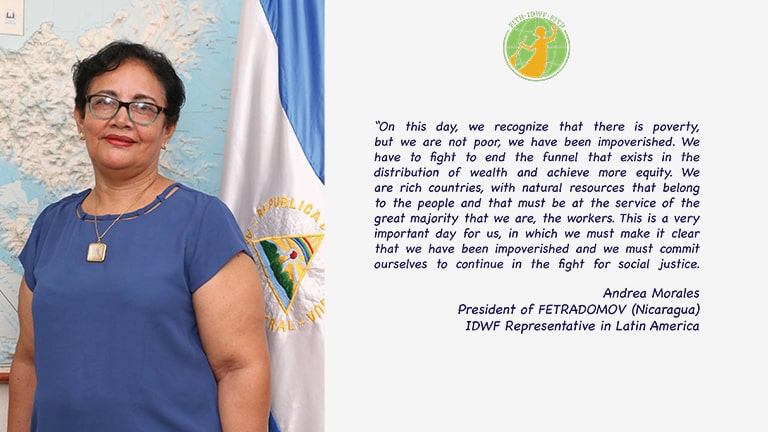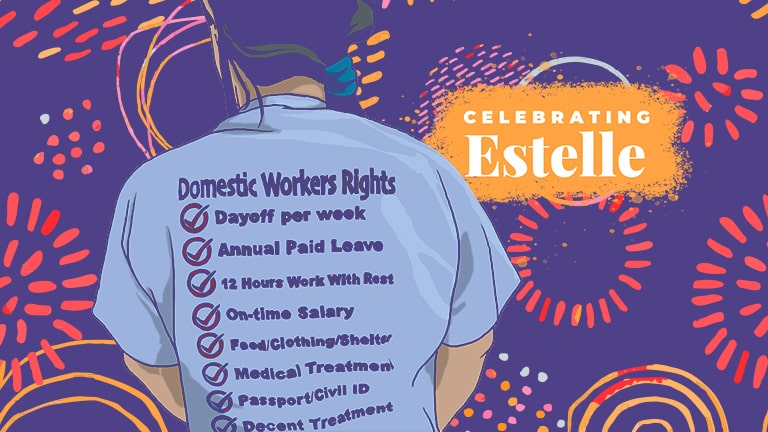“On the International Day to Eradicate Poverty, we spoke to unionists and domestic worker leaders on their insights of how poverty affects the sector of domestic work and how women bear its disproportionate burden. Full of power, these leaders envisioned a more equitable world, with decent work for domestic workers, free of economic and gendered violence. Hear their voices!”
Details
Nicaragua –
Andrea Morales is President of FETRADOMOV (Nicaragua) and representative of the International Domestic Workers Federation for Latin America.
Fernanda: In recent years, there has been more and more talk about the “feminization of poverty,” and this is felt with force in the sector of domestic work. How is it so? How are domestic work, poverty and gender issues related?
Andrea: The feminization of poverty is a reality that has been around for many years. The concept seeks to explain how poverty affects women and how it prevents them from having a full life. Poverty has the face of a woman, because we are the ones who work in the homecare economy. The gender policies that have been implemented in some places are good practices that allow women to have a full life. The role that we have been playing in the family, both in the First and in the Third World, is important because all the care work falls on us. Women have been integrating into the labor market, but men did not integrate into the family and household chores to the same extent. We must talk about feminist economics, because it is us who are affected by the patriarchal and macho system that stands on our shoulders. Today we continue to carry neoliberal policies.
F: In the times of a pandemic, the need for decent work for domestic workers has been exposed and with it the need for the ILO Domestic Workers Convention C189 to be ratified in some countries and effectively implemented in others. The need for the ratification of ILO Convention on Violence and Harassment in the World of Work C190 is also evident, by virtue of the many cases of domestic workers confined to their employers and being victims of abuse, violence, and harassment…
A: Convention 189 is especially important, because it is aimed solely and exclusively at domestic workers and contemplates human and labor rights in our sector. Convention 190 is an additional instrument that aims to eliminate violence in the world of work, for both men and women. So, while C189 is especially important for us, C190 includes other individuals related to harassment and violence suffered by women and men workers.
F: FETRADOMOV has played an active role in the fight against gender-based violence. Tell me what you are currently working on and if you see the ratification of C190 in Nicaragua as possible.
A: Within our organization, we are training our colleagues on the topic of Gender-Based Violence (GBV) through workshops. This has allowed us to raise awareness, because many women believe that violence is normal and natural because they suffer so much from it.
In addition, we have a committee for the ratification of C190, made up of representatives of the Inter-Union Migration Committee, the National Committee of Women Trade Unionists and two organizations that work with the maquila (factory). The organizations that are part of this committee are affiliated with international federations. We have already held two forums and we will hold a third in November, in preparation to a national and Central American campaign on care. In this campaign, we are going to highlight the violence that women domestic workers suffer at the national and regional levels. That will allow us to advocate with decision makers.
We will do face-to-face activities, but also a lot of activity on social networks. I believe that this year the ratification of C190 in Nicaragua will not be possible, but we are acting for next year. It seems to me that there are great possibilities that Nicaragua will ratify it, because it has already ratified C189 and it is a country that has excellent laws that allow us to strengthen our work.
F: And what possibilities do you see at the regional level?
A: It will be difficult to ratify after this pandemic. I believe that trade union organizations that have international affiliation should lead the campaign for ratification. Sometimes, the situation at hand separates us from the strategic goals, and since the pandemic is the priority now, union actions in pursuit of the ratification of C190 have stopped. Nicaragua was the fourth country in the world and the first in Central America to ratify C189, but there are countries like Honduras, Guatemala and El Salvador that have not yet ratified it. Argentina is seen as the next to ratify C190, and there are others with probabilities, but due to the current situation I do not think it will be very soon.
F: What are the main challenges for the Domestic Workers’ movement in terms of decent work and the eradication of violence and harassment?
A: One of the big problems we have at the regional level is the affiliation of the Domestic Workers to Social Security, and another is the issue of salary. Although in some countries a salary is contemplated for the sector, this is often not met. It also happens that many colleagues work overtime and are not paid because they do not have a work contract. For all this, we must keep pushing for the implementation of C189, from which we are still light years away.
The Convention is not fully implemented, despite having been ratified: there are violations of the stipulated salary and there are violations of Social Security affiliation. With the pandemic, we realized how affected the Domestic Workers without Social Security were. This situation represents a great setback, and even more so considering that their employers are also suffering from unemployment.
F: What do you think is more important: the implementation of C189 or the ratification of C190? What should the movement prioritize right now?
A: I think we need to keep working hard on C189, but we cannot let C190 be “empty words” either. The two must go hand in hand, with one leaning on the other. They are like the two arms of a person, just as necessary. We have a route on how to work, and it is possible to work on both at the same time, because they are two instruments that strengthen each other.
F: Covid-19 has exposed the vulnerability of the sector and has represented a setback in the fight for rights, not only in the workplace, but also in relation to violence and discrimination. The Domestic Work sector is subject to intersectional factors: poverty, racial, and gender discrimination, gender, etc. How do you think we can dignify Domestic Workers, considering their contribution to the world economy and their degree of importance to the Gross Domestic Product (GDP) of the countries?
A: Before the pandemic, some thought that money multiplied by itself. But COVID-19 has made it truly clear that the workforce is essential to reproduce wealth. Although Domestic Workers do not work in companies that generate income, it is their job that enables income production. States and companies have taken advantage of this reproductive workforce to satisfy their needs to reproduce capital. For this reason, we must dignify the work inside households and the women who do it.
To reproduce capital, a reproductive machinery is needed, and that role is played by women in a capitalist, patriarchal, sexist system, where they are assigned to gendered tasks. We need it to be recognized because our work is not just any work: It is the work that allows the reproduction of capital. If those who work in a company or in the state apparatus did not have someone to take care of the most precious thing in their life, such as their children, their house and even their animals, they would not be able to carry out their work. We must be well positioned, knowing that the work we do is fundamental, and that is why we have to grow organizationally and strengthen ourselves to demand public policies in favor of Domestic Workers. Systems and states must become aware that we are not “a necessary evil”, but we are part of the production chain of the market economy and we deserve to be recognized as such.
F: What is your message for Domestic Workers on the International Day for the Eradication of Poverty?
A: On this day, we recognize that there is poverty, but we are not poor, we have been impoverished. We must fight to end the funnel that exists in the distribution of wealth and achieve more equity. We are rich countries, with natural resources that belong to the people and that must be at the service of the great majority, the workers. This is an especially important day for us, in which we must make it clear that we have been impoverished and we must commit ourselves to continue in the fight for social justice.







